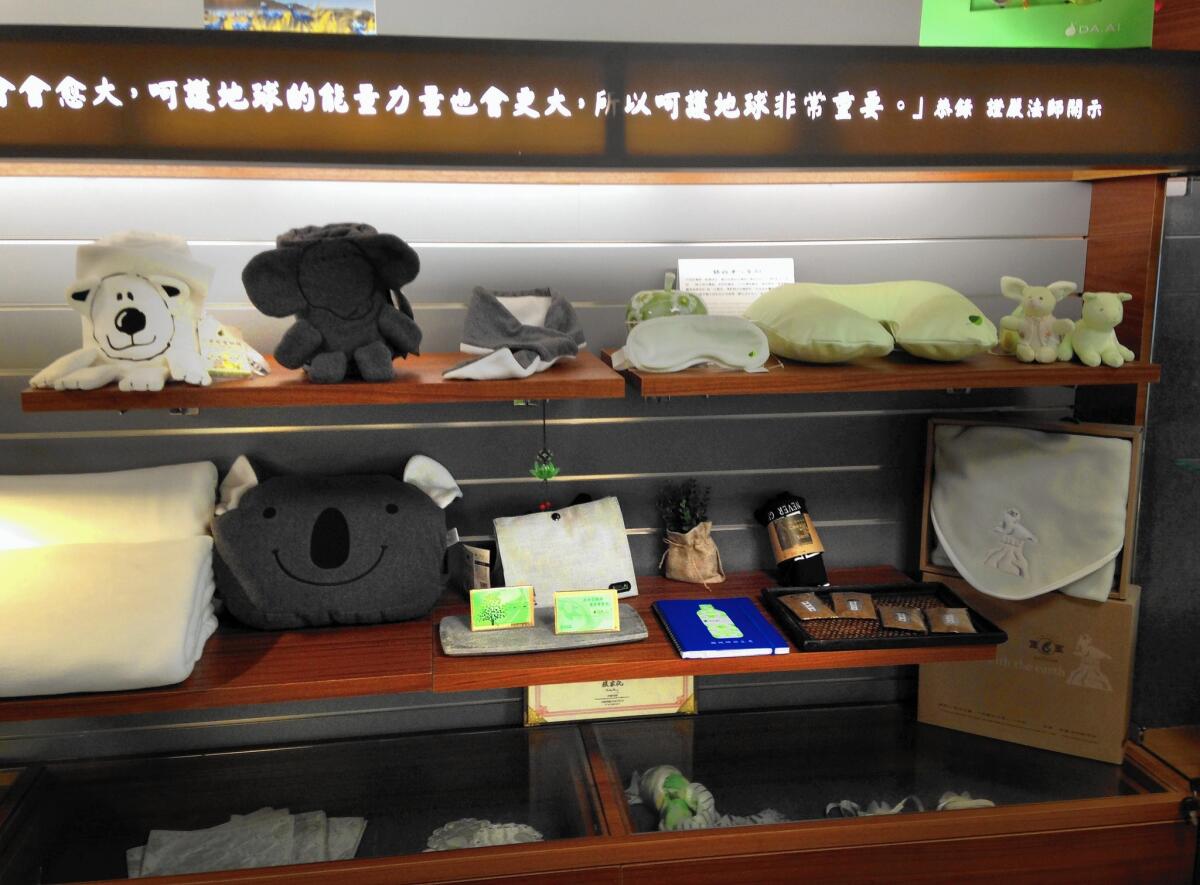Taiwan Buddhists transform plastic waste

- Share via
Reporting from TAIPEI, Taiwan — Millions of discarded plastic bottles that might normally land in Taiwan’s trash are being diverted into the hands of Buddhists, becoming items of transformation — although not of a strictly spiritual nature.
Thousands of religious volunteers are taking the discards and turning them into shirts, toys and suitcases sold as far afield as San Diego.
Da Ai Technology Co., a nonprofit company funded by the Tzu Chi Foundation, gathers 2,000 tons of plastic bottles each year in Taiwan from a total of 100,000 tons tossed out. Tens of thousands of volunteers at some of the foundation’s 5,600 recycling centers sort bottles by color, strip them of labels and bundle them. The bundles are then crushed into a coarse sand, from which machines can pull out thin threads of polyester fiber.
The effort began in 2006 to make blankets for disaster victims; now, it has grown into a sales network across Taiwan and in more than 10 overseas markets, generating proceeds of nearly $10 million a year. Much of that goes toward Tzu Chi’s Buddhism-inspired news and drama television channel, which is based in Taiwan and broadcasts overseas via satellite.
The charity also has the option of using proceeds to fund its global disaster relief work, which has taken Tzu Chi volunteers to the Gulf Coast after Hurricane Katrina in 2005 and to southern China after a 2008 earthquake that killed nearly 70,000 people.
Tzu Chi, which means “compassionate relief” in Chinese, was founded in 1966 by Taiwanese Buddhist nun Cheng Yen, then 29, to do relief work around the world; it now has branches in 47 countries. Its U.S. headquarters is in San Dimas, with service centers in Northridge, Torrance, Cerritos and West Los Angeles, among other places.
Tzu Chi began its first major environmental effort in 2006 with the recycling of bottles. More than 90% of the charity’s revenue, which totaled $322 million last year, comes from donations.
“Da Ai” in its company’s name translates to “big love.” The company’s products sell in 40 stores around Taiwan and through private retailers overseas.
But the company says recycling bottles into garments is not about money.
“Our expansion I would say is steady,” said James Lee, the technology company’s president and CEO. “But this is not a promotion to invite you to come buy clothes. It’s a way for you to feel that a piece of clothing can embody a lot of people’s hard work and that the result of that hard work is being handed back to society.”
Companies such as Nike and Patagonia also make garments from recycled plastic. But Da Ai representatives say they believe they are the only entity doing such work with volunteer labor, for charitable ends, for example donating blankets to thousands displaced by deadly mudslides in Taiwan in 2009.
“Their ability to mobilize people is fast, faster than the government,” said George Hou, associate media studies professor with I-Shou University.
After volunteers sort and bundle the bottles, a noisy, assembly-line process carried out by fast-moving people wearing Tzu Chi’s signature blue shirts, Da Ai turns the raw material over to factories on a contract basis. The factories produce shirts, shoes, suitcases and stuffed animals.
At least half the raw material for each product comes from recycled plastic bottles. A ton of bottles can make up to 8,000 items of clothing.
At Jing Si Books & Cafe in San Diego, about 10 Da Ai Technology blankets or garments sell per week, said clerk Chris Pappas. “Everyone seems to jump on it,” he said. “They like the idea of recycling and reuse.”
Da Ai’s sparkling, air-conditioned Taipei showroom sells hundreds of casual garments and other cloth-based merchandise made from the bottles. One of the more elaborate pieces is a $164 suitcase with backpack straps and a solar-powered USB recharger for phones and other gadgets.
Other products, all designed by people on the company’s paid staff of 80, include a $3 fan and a formal Chinese-style men’s suit. Every item comes in one of four colors — green, gray, white and dark blue — that naturally emerge from the recycling process. Customers occasionally complain about a lack of warmer colors, but the company is unwilling to add dyes.
Da Ai would rather people cut back and reduce waste, but as long as bottles are landing in Taiwan’s garbage, the organization wants to add capacity and refine its technology to process more of them into clothes, said Lee, the CEO.
“It’s best not to buy bottles,” Lee said. “The point of Da Ai Technology’s sales is not to do trade but to use clothing to educate people that recycling plastic is great but not using it is better.”
Jennings is a special correspondent.
More to Read
Sign up for Essential California
The most important California stories and recommendations in your inbox every morning.
You may occasionally receive promotional content from the Los Angeles Times.













